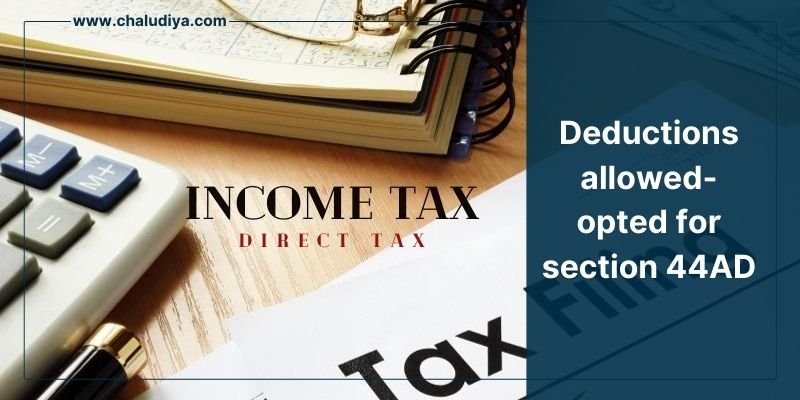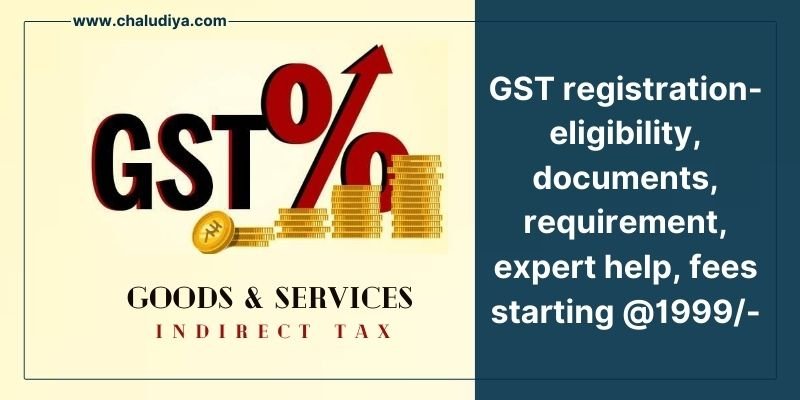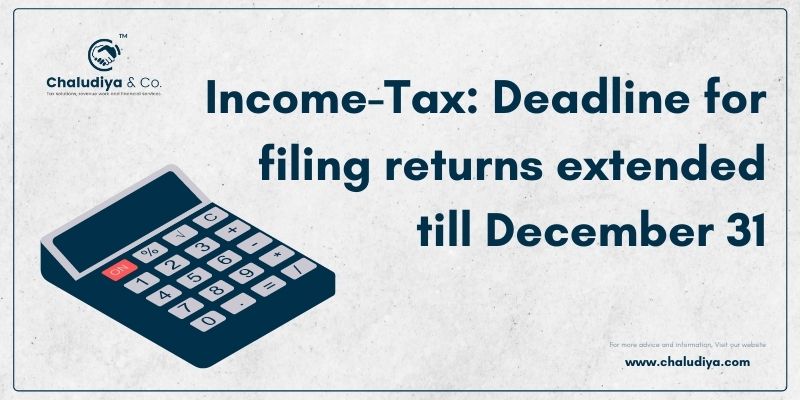- Have any questions?
- +91 76983 15026
- info@chaludiya.com
GST registration-eligibility, documents, requirement, expert help, fees starting @1999/-

Check these legal documents before buying a property
June 18, 2020
Deductions allowed- opted for section 44AD
June 21, 2020GST is the product of the biggest tax reform in India which has tremendously improved ease of doing business and increasing the taxpayer base in India by including millions of small businesses. Tax complexities would be reduced due to the abolishing and subsuming of multiple taxes into a single, simple system.
The new GST regime mandates that all entities involved in buying or selling goods or providing services or both are required to register and obtain GSTIN. Registration is mandatory once the entity crosses a minimum threshold turnover or when an individual starts a new business that is expected to cross the prescribed turnover.
Businesses are required to register for GST if they fall into one of the following criteria.
- Aggregate turnover
Any service provider who provides a service value of more then rs. 20 lac aggregate in a year is required to obtain GST registration. In the special category states, this limit is rs. 10 lac. Any entity engaged in the exclusive supply of goods whose aggregate turnover crosses rs.40 lac is requred to obtain GST regisration.
- Inter-state business
An entity shall register for GST if they supply goods inter i.e., from one state to another irrespective of their aggregate turnover. Inter state service providers need to obtain GST registration only if their annual turnover exceeds rs.20 lac. (In special category states, this limit is rs.10 lac).
- E-coommerce platform
It is mandatory for e-commerce operator (as defined above) to obtain GST registration irrespective of the value of supply made by them.
GST Registration for the person selling through e-commerce operator:
All the members who undertake supplies through e-commerce websites, should mandatorily obtain GST registration irrespective of the value of supply made by them. The entity should apply for the GST registration irrespective the ownership of the websites and goods supplied.
Services Notified u/s 9(5) of CGST Act, 2017:
In case services notified u/s 9(5), the e-commerce operator is liable to pay tax, on behalf of the suppliers. If such services are supplied through its platform, all the provisions of the Act shall apply to such e-commerce operator as if he is the supplier for this purpose.
- Casual Taxable Person
All Casual taxable persons have been provided special treatment under GST. The GST Act defines as a casual taxable person as a person who occasionally undertakes transactions involving the supply of goods or services or both in the course or furtherance of business, whether as principal, agent or in any other capacity, in a State or a Union territory where the entity has no fixed place of business. Hence, persons running temporary businesses in fairs or exhibitions or seasonal businesses would fall under casual taxable person under GST. In this article, we look at GST registration for the casual taxable person.
- Voluntary registration
To support volunteer organisations and training institutions that provide support to Schedule Castes, Government of India (GoI) introduced Scheme of Grant-in-Aid to Voluntary Organisations and NGOs. The scheme for the schedule caste is supported by the Ministry of Social Justice and Empowerment (MoSJ&E) to provide a platform for the SCs to learn new skills to improve their chances of employment in any sector.
The types of GST registration varies depending on the kind of business undertaken and the supply location of goods or services.
- Normal scheme
This category applies to taxpayers operating a business in India. Taxpayers registering under the normal scheme do not require a deposit and are also provided with unlimited validity date.
- Non-resident taxable person
A non-resident taxable person under GST is any person or business or not-for-profit who occasionally undertakes transactions involving the supply of goods or services or both, whether as principal or agent or in any other capacity, but who has no fixed place of business or residence in India. Hence, any foreign person or foreign business or organisation supplying goods or services to India would be a non-resident taxable person – requiring compliance with all GST regulations in India.
- Composition scheme
Small businesses are the backbone of the Indian economy and there are an estimated 55 million Micro, Small and Medium Enterprises operating in India. The rollout of GST would have extensive impact on over ten million SME businesses operating in India and would require compliance under the GST regime. However, many small businesses would not have the expertise or the capability to comply with many of the GST regulations, unlike medium and large sized businesses. Hence, to make GST compliance easy for micro, small and medium enterprises operating in India, there exists a GST composition levy scheme. In this article, we look at the GST Composition Levy scheme in detail along with eligibility criteria and application procedure.
The following documents must be submitted by regular taxpayers applying for GST registration.
- PAN card of the business
GST registration is linked to the PAN of the business. Hence, PAN must be obtained for the legal entity before applying for GST Registration.
- Identity proof along with photographs
PAN, passport, driving license, aadhar card or voter’s identity card can be submitted as identity proof. Photographs of the promoters/ proprietors also need to be submitted.
- Address proof of promoter
Documents like passport, driving license, aadhaar card, voters identity card and ration card can be submitted as address proof.
- Business registration document
Proof of business registration must be submitted for all types of entities. There is no requirement of submitting this document for a proprietorship as the proprietor and the entity are essentially considered the same. In case of a partnership firm, the partnership deed must be submitted. In case of LLP or Company, the incorporation certificate from MCA must be submitted. The other types of entities like society, trust, club, government department or body of individuals must provide the registration certificate.
- Business location proof
Address proof must be provided for all places of businesses mentioned in the GST registration application. The following documents are acceptable as address proof for GST registration.
Own property- Any document in support of the ownership of the premises like the latest property tax receipt or the municipal khata copy or copy of the electricity bill.
Rented or leased property- A copy of a valid rental agreement with any document in support of the ownership of the premises of the lessor like the latest property tax receipt or the municipal khata copy or copy of the electricity bill. If the rental agreement or lease deed is not available, then an affidavit to that effect along with any document in support of the possession of the premises like copy of electricity bill is acceptable.
SEZ premises- If the principal place of business is located in an SEZ or the applicant is an SEZ developer, necessary documents/certificates issued by the government of India are required to be uploaded.
All other cases- A copy of the consent letter of the owner of the premises with any document in support of the ownership of the premises of the consenter like the municipal khata copy or the electricity bill copy. The same documents can be uploaded for shared property as well.
- Bank account proof
Scanned copy of the first page of bank passbook or the relevant page of bank statement or scanned copy of a cancelled cheque containing name of the proprietor or business entity, bank account no., MICR, IFSC and branch details including code needs to be uploaded.




